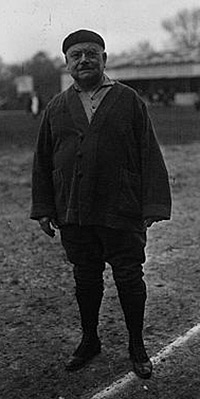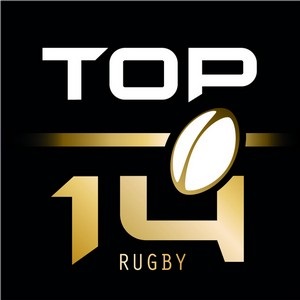Bouclier de Brennus: Le Holy Grail
The trophy for winning the French championship is the Bouclier de Brennus. Grand Slams and things are all very nice but nothing beats the Bouclier de Brennus for ecstasy, euphoria and sheer glee.
The New Zealanders call the Ranfurly Shield the Log. In Occitan, the language of Southern France, the French call the Bouclier de Brennus Le Planchòt, the Plank. Both shields go back over a 100 years, Brennus's shield nine year's older than Ranfurly's. The Currie Cup as a competition started in 1890.
The Bouclier de Brennus is named after a man – no, not after the romantic, hero who fought the ancient Romans but after Charles Brennus, though it is not quite as simple as that. His parents, obviously steeped in France's distant past, named him after two famous opponents of the Romans, real men. His name was Brennus Ambiorix Crosnier, born in 1859, died in 1943, generaly known as Charles Brennus. Brennus had sacked Rome in the 4th Century BC while Ambiorix had withstood Julius Caesar, of all people, in the 1st century BC.
Charles Brennus it was that made and gave his name to the shield in 1892. Brennus was the founder of USFSA (Union des Sociétés Françaises de Sports Athlétiques). His friend who had a say in the creating of the shield was the more famous Pierre de Coubertin, who is regarded as the father of the modern Olympic movement. De Coubertin did the design and Brennus, an engraver by profession, did the sculpting in brass on a wooden support of ash. The shield has the USFSA coat of arms and the world Ludus pro Patria: a game for the nation. It also had a plaque for the names of the winners.
When USFSA split into several sporting bodies, one of them, the French Rugby Federation, took the shield with them. The legal custodians of the shield are SCUF (Sporting Club Universitaire de France) who have never themselves won the trophy though they were losing finalists in 1911 and 1913. Each year two SCUF players hand over the trophy to the winners.
What is awarded now is not the original. In 2003 it was decided that the battered original would be restored and kept safe. What is handed over now is a replica which gets carted about in celebration, ending the centre of an unruly assembly, and, for players, a jolly ticket to free wine wherever its bearers make a raucous stop. It will take its share of battering while the restored original rests in splendour, as it is entitled to do.
Winners Down the Years
1892: Racing Club de France
1893: Stade Français
1894: Stade Français
1895: Stade Français
1896: Olympique
1897: Stade Français
1898: Stade Français
1899: Bordeaux
1900: Racing Club de France
1901: Stade Français
1902: Racing Club de France
1903: Stade Français
1904: Bordeaux
1905: Bordeaux
1906: Bordeaux
1907: Bordeaux
1908: Stade Français
1909: Bordeaux
1910: Lyons
1911: Bordeaux
1912: Toulouse
1913: Bayonne
1914: Perpignan
1915–1919 Replaced by Coupe de l'Espérance during First World War
1915–1916: Toulouse
1916–1917: Nantes
1917–1918: Racing Club de France
1918–1919: Tarbes
1920: Tarbes
1921: Perpignan
1922: Toulouse
1923: Toulouse
1924: Toulouse
1925: Perpignan
1926: Toulouse
1927: Toulouse
1928: Pau
1929: Quillan
1930: Agen
1931: Toulon
1932: Lyons
1933: Lyons
1934: Bayonne
1935: Biarritz
1936: Narbonne
1937: Vienne
1938: Perpignan
1939: Biarritz
1940–42: No award
1943: Bayonne
1944: Perpignan
1945: Agen
1946: Pau
1947: Toulouse
1948: Lourdes
1949: Castres
1950: Castres
1951: Carmaux
1952: Lourdes
1953: Lourdes
1954: Grenoble
1955: Perpignan
1956: Lourdes
1957: Lourdes
1958: Lourdes
1959: Racing club de France
1960: Lourdes
1961: Béziers
1962: Agen
1963: Mons
1964: Pau
1965: Agen
1966: Agen
1967: Montauban
1968: Lourdes
1969: Bègles
1970: La Voulte
1971: Béziers
1972: Béziers
1973: Tarbes
1974: Béziers
1975: Béziers
1976: Agen
1977: Béziers
1978: Béziers
1979: Narbonne
1980: Béziers
1981: Béziers
1982: Agen
1983: Béziers
1984: Béziers
1985: Toulouse
1986: Toulouse
1987: Toulon
1988: Agen
1989: Toulouse
1990: Racing Club de France
1991: Bègles
1992: Toulon
1993: Castres
1994: Toulouse
1995: Toulouse
1996: Toulouse
1997: Toulouse
1998: Stade Français
1999: Toulouse
2000: Stade Français
2001: Toulouse
2002: Biarritz
2003: Stade Français
2004: Stade Français
2005: Biarritz
2006: Biarritz
2007: Stade Français
2008: Toulouse
2009: Perpignan
2010: Clermont Auvergne
2011: Toulouse
2012: Toulouse
2013: Castres
2014: Toulon
This year it will be Clermont or Stade Français.
Winning has not always ensured future success. Two of the winners this century – Biarritz and Perpignan were relegated and before that winners such as Tarbes, Racing, Béziers, Bègles and Agen. And one wonders where miraculous Lourdes are now that the Prat brothers are not playing anymore.



































